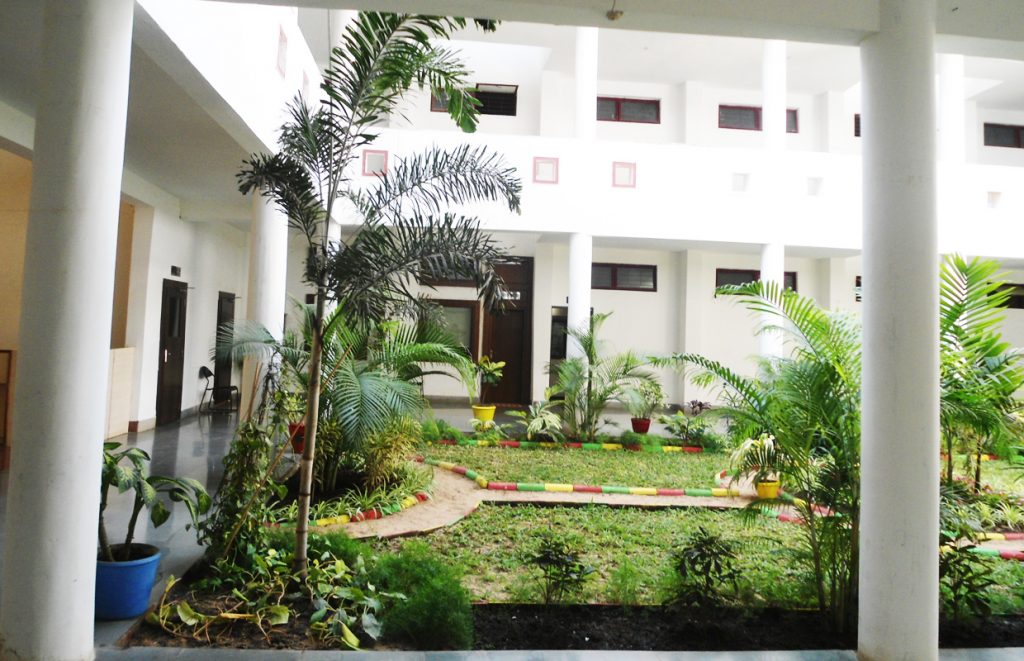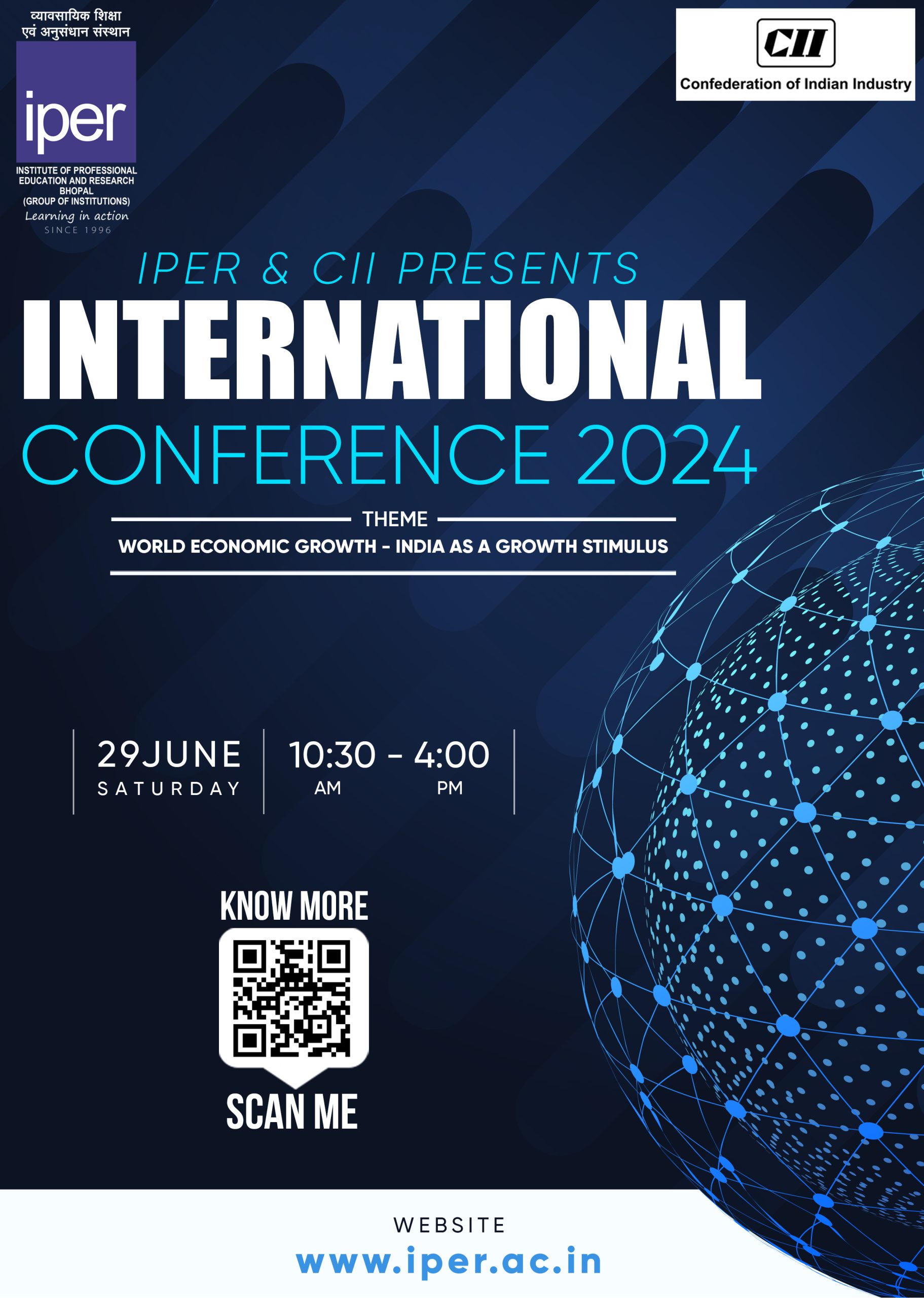

“World Economic Growth – India as a Growth Stimulus”
The world economy is a multifaceted and unified system comprising the economic activities of individual countries and their interactions. Global economic growth will pick up the pace very soon as the entire world advances itself towards a prosperous future. Although, Developed countries play a significant role in shaping and influencing the global economy due to their advanced infrastructure, technology, and high levels of productivity, synchronously, developing countries too, have a substantial impact on the development of the world economy. Among all the major economies the designation of India, which is currently the world’s fifth-largest economy, to grow at 6.4%, is standing ahead. The country’s large and diverse population, a burgeoning middle class, and a growing digital economy have positioned it as a key player in the global economic landscape. India has a younger and often more abundant labour force. This demographic advantage can contribute to increased productivity and economic output. Additionally, as the country improves education and skill altitudes, it is becoming more attractive to international businesses seeking cost-effective labour.
India is set to become the third-largest economy by the year 2030, and it is expected to be the fastest-growing major economy in the following three years. Specifically to mention the most highlighted factor is its dynamic economic landscape that is constantly evolving at the fastest pace.
India because of its strong advent as an emerging economy, technological shifts, and geopolitical changes is influencing the global economic order in a very impactful manner. The Indian diaspora is spread across the world and plays a vital role in various sectors, including technology, healthcare, tourism, academia, and business. For nurturing a more equitable and stable global economic environment, international cooperation, fair trade practices, and inclusive economic policies are some distinctive dynamics of India.
General Management:
- Global Economic Outlook: India’s Role in Post-Pandemic Recovery
- Trade and Geopolitics: India’s Bilateral and Multilateral Engagements
- Technology and Innovation: India’s Contribution to Global Progress
- Sustainable Development Goals (SDGs): India’s Roadmap for a Better World
- Crisis Management and Resilience: Learning from India’s Experiences
- Global Partnerships for Economic Growth: The Indian Model
and other General Management topics, if any……
Finance:
- Indian Financial Markets and Global Investments: Opportunities and Challenges
- Fintech Innovation in India: Shaping the Future of Global Finance
- Cross-Border Capital Flows and India’s Role in the International Financial System
- Sustainable Finance: Integrating Environmental, Social, and Governance (ESG) Principles
- Government Policies and Regulatory Frameworks: Impact on Global Financial Stability
- Infrastructure Financing for Sustainable Development: India’s Initiatives and Global Implications.
and other Finance topics, if any……
Marketing:
- Consumer Behavior in Emerging Markets.
- Digital Marketing Strategies in India.
- Sustainable Marketing Practices.
- E-commerce Dynamics.
- Market Entry Strategies for International Companies in India.
- Innovations in Indian Marketing.
- Government Policies and Market Dynamics.
- Rural Marketing Strategies.
- Product Innovation.
- Logistics & Supply chain management Digital Marketing
and other General Marketing topics, if any……
Human Resource:
- Talent Acquisition in a Globalized World: Insights from India’s Workforce
- Diversity and Inclusion: Lessons from India’s Corporate Culture for Global Companies
- Leadership Development: Indian Practices and their Applicability Worldwide
- Workplace Flexibility and Remote Work: A Post-Pandemic HR Paradigm
- Employee Well-being and Mental Health: A Global Imperative with Indian Solutions
- HR Technology Trends: India’s Innovations Shaping the Future of Work Worldwide
and other Human Resource topics, if any……

Publication Details
All selected abstracts and few selected papers will be published in a UGC approved journal/ book format carrying ISBN No. by Excel Publication, and few selected papers will be published in UGC Care listed Journal/Scopus index journal.
Submission Deadlines: –
| Submission of Abstract | 29th Feb 2024 |
| Full Paper Submission (By Invitation) | 30th April 2024 |
| Registration Deadline | 20th May 2024 |
Paper Submission & Presentation Fees: –
| Research Scholars / Students | INR 500 |
| Faculty Members | INR 2000 |
| Corporate Practitioners | INR 4500 |
| Foreign Delegates | 100$ |
Participating / Attending Fees: –
| Research Scholars / Students | INR 100 |
| Faculty Members | INR 250 |
| Corporate Practitioners | INR 500 |

Guidelines & Specifications
Guidelines For Abstracts
- An abstract must focus on a topic related to the theme.
- All Submitted abstracts must have a title page, discipline, sub-theme of paper, the name(s) of the author(s), affiliation(s), complete address, of all the authors including phone, fax, e-mail address and biographical note(s) (max 100 words) of the authors(s).
- The abstract & full length paper should be sent through e-mail at the following E-mail ID: conference@iper.ac.in
Guidelines For Full Paper
- All Full Paper submissions must have a title page, discipline, sub-theme of the paper, the name(s) of the author(s), affiliation(s), complete address, of all the authors including phone, fax, e-mail address and biographical note(s) (max 100 words) of the author(s).
- The title of the paper must be written in bold capital letters using 14pt Times New Roman font. All sub-headings should also be written in bold capital letters. All authors will individual register & will receive an acknowledgement of the Full Paper, Registration Form and Registration Fees by E-mail, after the receipts of the same.
Specifications For Papers
Length : 3000-6000 words
Language : English
Spacing : Single
Font : Times New Roman
Font Size of text : 12
Margin : Half Inch (on all four sides)
General Guidelines
- All manuscripts should be professionally proof-read before the submission.
- The content should be original & unpublished work.
- IPER is not responsible for any claim made in any of the papers accepted for publication in the proceedings. The author(s) of each paper are solely responsible for the content, referencing of their paper are also responsible for ensuring that manuscripts they have submitted for publication in the proceedings have not been published elsewhere and contain no material previously published or written by another person, except when due reference is made in the text of the paper.
- The author must check the plagiarism of their research paper and send their report with paper.

For Registration Contact:
(Dr.) Harish Sudhir Kulkarni, (Conference Convenor)
IPER (Technical Campus), Bhopal (M.P.) – 462026
Mobile No.:- (91) 9300816797 Email: conference@iper.ac.in
Telephone Number:- 0755-2706100,01
Mailing Address:- Opposite British Park, 11 Mile, Hoshangabad Road, Misrod, Bhopal (M.P.) 462026, India
IPER HELPLINE NO:- 0755-2706100,01 | Website: www.iper.ac.in
